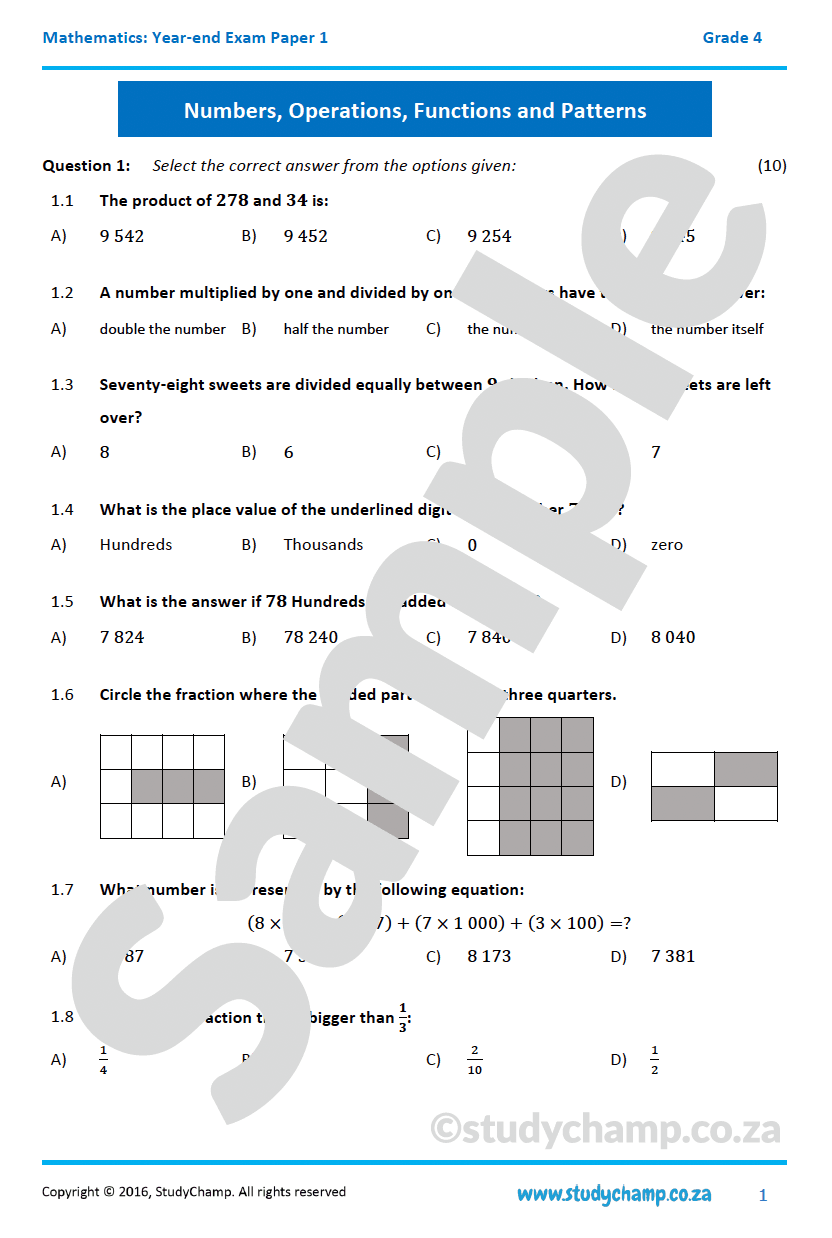
Grade 4 Maths Exam Papers in South Africa: An Overview
Introduction
Mathematics plays a crucial role in the development of critical thinking, problem-solving, and logical reasoning skills. In South Africa, Grade 4 learners are required to take mathematics exams as part of their formal education. These exams assess their understanding of fundamental mathematical concepts and their ability to apply them in various contexts. This article provides a comprehensive overview of Grade 4 Maths Exam Papers in South Africa, including their structure, content, and assessment criteria.
Structure of Grade 4 Maths Exam Papers
Grade 4 Maths Exam Papers in South Africa typically consist of two sections:
- Section A: Multiple-choice questions (MCQs)
- Section B: Open-ended questions
Section A: Multiple-Choice Questions
- Number of questions: 20-30
- Time allocation: 30-45 minutes
- Question types:
- Numerical questions: Test basic arithmetic operations, number sense, and place value.
- Geometric questions: Assess understanding of shapes, angles, and symmetry.
- Measurement questions: Evaluate knowledge of length, mass, and time.
- Data handling questions: Analyze simple graphs and tables.
Section B: Open-Ended Questions
- Number of questions: 5-10
- Time allocation: 60-90 minutes
- Question types:
- Problem-solving questions: Require learners to apply mathematical concepts to solve real-world problems.
- Short answer questions: Test specific mathematical skills, such as multiplication tables or fraction equivalence.
- Extended response questions: Assess learners’ ability to explain their mathematical reasoning and justify their solutions.
Content of Grade 4 Maths Exam Papers
The content of Grade 4 Maths Exam Papers in South Africa is aligned with the Curriculum and Assessment Policy Statement (CAPS) for Mathematics. The following topics are typically covered:
- Numbers, Operations, and Relationships:
- Place value and number sense
- Addition and subtraction
- Multiplication and division
- Fractions and decimals
- Measurement:
- Length, mass, and time
- Perimeter and area
- Geometry:
- Shapes and their properties
- Angles and symmetry
- Transformations
- Data Handling:
- Collecting and organizing data
- Representing data in graphs and tables
- Algebra:
- Simple equations and inequalities
Assessment Criteria
Grade 4 Maths Exam Papers are assessed using the following criteria:
- Accuracy: Correctness of answers and calculations
- Reasoning: Logical and clear explanation of mathematical thinking
- Problem-solving: Ability to apply mathematical concepts to solve problems
- Communication: Clear and concise presentation of solutions
- Number sense: Understanding of number relationships and operations
Grading System
The grading system for Grade 4 Maths Exam Papers in South Africa typically follows a 7-point scale:
- 7: Outstanding
- 6: Excellent
- 5: Good
- 4: Fair
- 3: Satisfactory
- 2: Needs Improvement
- 1: Unsatisfactory
Importance of Grade 4 Maths Exam Papers
Grade 4 Maths Exam Papers play a significant role in the educational journey of learners. They:
- Assess Mathematical Understanding: Evaluate learners’ comprehension of mathematical concepts and their ability to apply them in various contexts.
- Identify Areas for Improvement: Help teachers and learners identify areas where additional support or remediation is needed.
- Provide Feedback: Offer learners feedback on their progress and areas for improvement.
- Motivate Learners: Encourage learners to strive for academic excellence and develop a positive attitude towards mathematics.
- Prepare for Future Assessments: Serve as a stepping stone for future mathematics assessments, such as the National Senior Certificate (NSC) examinations.
Conclusion
Grade 4 Maths Exam Papers in South Africa are an essential component of the mathematics education system. They assess learners’ understanding of fundamental mathematical concepts and their ability to apply them in various contexts. By providing accurate and reliable assessments, these exams help teachers and learners identify areas for improvement, motivate learners, and prepare them for future academic challenges.
